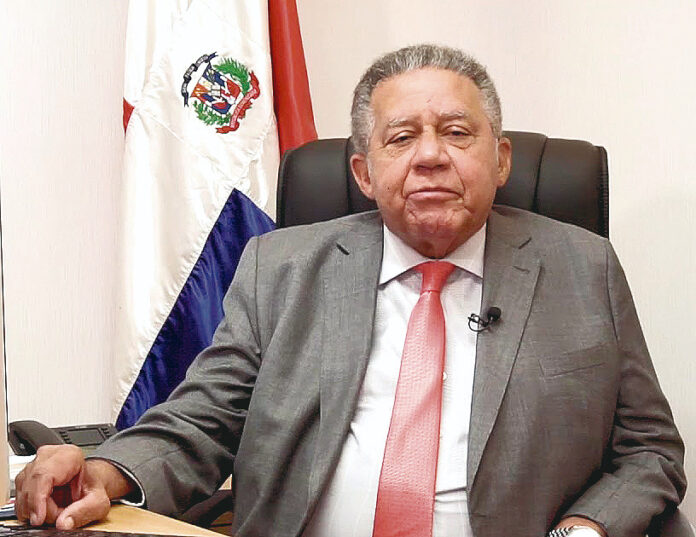
(Français)
The Dominican ambassador to Spain has called out Dominican politicians who employ rhetoric and promote policies against Haitians that are based on hate.
He also addressed the Dominican people, amplifying this message and urging them to let go of negative Haitian stereotypes that lead to conflict.
Juan Bolívar Díaz is one of the most internationally recognized and honored Dominicans of his generation. Currently in his late seventies, he was appointed the Dominican ambassador to Spain in 2020.
Prior to that, he was a highly accomplished journalist and media presence for 52 years. Among his more recent honors, he was invited to be a member of the Committee for America of the Pro-Royal Spanish Academy Foundation. This board consists of major cultural figures from around Latin America, such as Peruvian novelist Mario Vargas Llosa.
But Díaz is more than a ceremonial eminence grise. He soldiers on as an inveterate advocate for social justice, a man who humbly yet resolutely speaks truth to power.
“Haiti is both a disgrace and a great benefit for the DR.”
This has been the ongoing theme of his life. In 1970, as a young journalist, he barely escaped a car bomb assassination attempt against him, and he was forced to flee the country.
Ultimately Díaz’s voice could not be repressed. Even in exile his status grew, and he continued to speak out on behalf of both advancing Dominican culture and preserving human rights.
Naturally, the role of Haiti in Dominican society has been a primary concern throughout his career. Last January he notably said “Haiti is both a disgrace and a great benefit for the DR.”
As a representative of the Dominican government, he is now not only shaping the news but making it. Last week, in an interview with the Dominican journalist Moises Gonzalez on the show Despertar Nacional, he returned to the topic of Haitian relations.
“I continue to support the positions that I have always maintained. I am not going to back off in preaching that Dominicans and Haitians have to understand each other, that we have to use a more constructive, less dramatic language, and to seek and promote solutions in Haiti if we do not, we are going to have to make do without Haiti.”
“Haiti is going to remain there in any case. We cannot follow policies that promote hatred and confrontation.”
The current melt down in relations indicates “the time has come for the Dominican Republic to recognize that it will never be able to do without Haiti and its market. The importance of this market is not only for the people who live on the border strip, it is also for producers of eggs, chicken, salami, pasta, cement, and many other industries.”
“More than a billion dollars per year are exported to that market, where we have a 9 to 1 advantage, it’s probably the most unequal binational market in the world,” he said.
Additionally he stated, “We cannot allow ourselves to sink to a permanent low level in relations, rather we must make an effort to recognize the value of Haitians. Haiti is not just a good trade opportunity, there are larger consequences that will undermine us if we don’t.”
Beyond border issues, he also noted that the Haitian workforce has been the engine for agriculture and construction, a pillar of the heralded growth of the Dominican economy.
“We have to recognize that they [Haitians] contribute, we cannot be saying the negative all the time, because if we do, we will not meet our collective potential,” he argued.
Another point of reference was the current news cycle. “We must find a way forward so that in ten years our relationship with Haiti has not deteriorated to the level of Israel and Palestine, two people who historically have been unable to coexist.” He called that a “luxury” the Dominican Republic cannot afford.
He regretted that there are many people in the Dominican Republic who maintain hate speech and stigmatization. “We must make an effort to moderate this discourse.”
Not surprisingly, there has been blow back. Bruno Valdeiras, writing in a Dominican paper called Al Momento, opines:
“These statements by the current Dominican ambassador to the Spanish kingdom are not unexpected at all; that has been his position for several years. The problem now with these statements is that he makes them from a government position, which does tremendous damage to the Dominican Republic and at the same time contradicts the position of the president of the Republic, Luis Abinader, in defending our national sovereignty.”
He goes on to suggest Díaz must be either mentally ill or corrupt.
Dominican food producers, who have lost a substantial share of their market due to the border closing, might have a different opinion.
It does beg the question, however, as to why the president would appoint a person with such diametrically opposed views to a high level government position. Could it be to trap him in a luxurious exile, too distracted or mollified to participate in the national discourse?
If so, it was another failed Abinader strategy.
Levyen Joseph lives among Haitians in the Dominican Republic.










[…] (English) […]
[…] (Anglais) […]